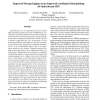Free Online Productivity Tools
i2Speak
i2Symbol
i2OCR
iTex2Img
iWeb2Print
iWeb2Shot
i2Type
iPdf2Split
iPdf2Merge
i2Bopomofo
i2Arabic
i2Style
i2Image
i2PDF
iLatex2Rtf
Sci2ools
129
click to vote
CLUSTER
2004
IEEE
2004
IEEE
Improved message logging versus improved coordinated checkpointing for fault tolerant MPI
Fault tolerance is a very important concern for critical high performance applications using the MPI library. Several protocols provide automatic and transparent fault detection and recovery for message passing systems with different impact on application performance and the capacity to tolerate a high fault rate. In a recent paper, we have demonstrated that the main differences between pessimistic sender based message logging and coordinated checkpointing are 1) the communication latency and 2) the performance penalty in case of faults. Pessimistic message logging increases the latency, due to additional blocking control messages. When faults occur at a high rate, coordinated checkpointing implies a higher performance penalty than message logging due to a higher stress on the checkpoint server. In this paper we extend this study to improved versions of message logging and coordinated checkpoint protocols which respectively reduces the latency overhead of pessimistic message logging a...
CLUSTER 2004 | Distributed And Parallel Computing | Message Logging | Message Logging Protocol | Pessimistic Message |
Related Content
| Added | 20 Aug 2010 |
| Updated | 20 Aug 2010 |
| Type | Conference |
| Year | 2004 |
| Where | CLUSTER |
| Authors | Pierre Lemarinier, Aurelien Bouteiller, Thomas Hérault, Géraud Krawezik, Franck Cappello |
Comments (0)

